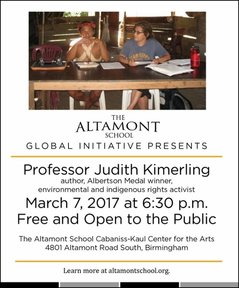 Join us for a conversation about cultural immersion, energy, and human rights as Professor Judith Kimerling relates her experiences with the indigenous people and the land in the Ecuadorian Amazon Rainforest. March 7, 2017 at 6:30 The Cabaniss-Kaul Center for the Arts The Altamont School --- "Judith Kimerling is a Professor of Environmental Law and Policy in the Political Science Department and Environmental Studies Program at The City University of New York, Queens College. She also taught law at CUNY School of Law for more than a decade. After graduating from University of Michigan and Yale Law School, she worked for seven years as an environmental litigator, including five years as an Assistant Attorney General for New York State, where she worked on the Love Canal litigation and other hazardous waste cleanup litigation and negotiations. In 1989, she moved to Ecuador and worked with indigenous organizations in the Amazon Rainforest to document the environmental and social impacts of oil development there. Her findings and photographs first placed concerns about the impact of oil extraction on indigenous peoples and the environment in tropical forests on the international environmental and human rights policy agendas. Her book Amazon Crude was called “the Silent Spring of Ecuador” by The New York Times. In the U.S., it prompted a historic class action lawsuit, Aguinda v. Texaco, Inc., which led to related proceedings in Ecuador and other fora. Professor Kimerling has worked with indigenous organizations and communities in the Amazon Rainforest for more than twenty seven years, and currently serves as international counsel for Ome Gompote Kiwigimoni Huaorani (Ome Yasuni), an alliance of grassroots Huaorani (Waorani) communities who came together to defend their culture and territory in the area now known as Yasuni National Park and Biosphere Reserve. Yasuni is world-renowned for biological diversity, and the Ome Yasuni Huaorani are working to protect the rainforest and defend the right of the Huaorani to continue to live freely and in accordance with their culture in what remains of their ancestral lands (including the right of neighboring Huaorani family groups to live in voluntary isolation). Professor Kimerling also serves on the Technical Advisory Committee of REDOIL, a network of Alaska Natives who work to promote sustainable development. Professor Kimerling received The Field Museum’s 2007 Parker/Gentry Award for Excellence and Innovation in Conservation/Environmental Biology for “her courageous and relentless work on behalf of indigenous peoples, riverine communities, and vast, intact forests in the headwaters of the Amazon.” In 2011, she was awarded the Albertson Medal in Sustainable Development for “her defense of the Amazon rainforest and the human communities that depend on it for their culture and survival.” She has been a Visiting Scholar at Yale Law School, and received a Feliks Gross Endowment Award for Outstanding Scholarly Achievement from The CUNY Academy for the Humanities and Sciences, and a Special Achievement Award from Rainforest Action Network."
0 Comments
Leave a Reply. |
AuthorThis blog is the collective voice of every person involved in the Global Initiative. Just as the globe hosts billions of disparate voices, we hope this space will embody and embrace the same diversity. Archives
July 2019
Categories |
 RSS Feed
RSS Feed
